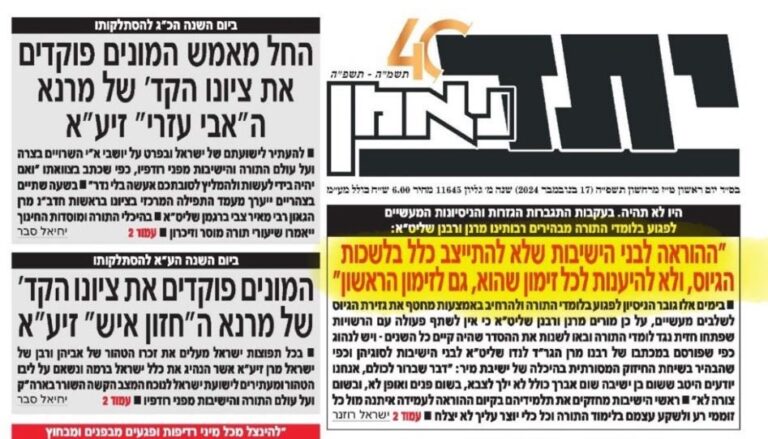Vayomer Moshe el Aharon hu asher dibeir Hashem leimor bikrovai ekadeish v’al p’nei kol ha’am ekaveid vayidom Aharon (10:3)
Parshas Tzav concludes by describing the service that Moshe performed for seven days to inaugurate the Mishkan. Parshas Shemini begins with the climax of this period, which was reached on the eighth day, at which time Aharon and his sons were consecrated to serve as Kohanim. Tragically, just at the peak of the joy of the inauguration ritual, Aharon’s two oldest sons, Nadav and Avihu, performed a service in the Mishkan which they weren’t commanded to do, and they paid for it with their lives.
Reacting to this terrible loss, Rashi writes that Moshe told Aharon that he knew that the Mishkan would be sanctified through the death of somebody close to Hashem, but he assumed that it would be either himself or Aharon. In light of what transpired, Moshe said that he now recognized that Nadav and Avihu were even greater than them. This comment is difficult to understand. How could Moshe, whom the Torah testifies (Bamidbar 12:3) was the most humble man to ever walk the earth, be so presumptuous as to assume that he was the most beloved by Hashem in his entire generation?
Rav Leib Chasman explains that this question is rooted in a fundamental misunderstanding about the nature of humility. People are accustomed to thinking of a humble person as one who views himself as low and unworthy. The Torah, however, doesn’t equate humility with low self-esteem. On the contrary, a humble person may be well aware of his tremendous talents and skills. Nevertheless, he doesn’t view himself as worthy of praise and respect for them. In his humility, he attributes his talents to Divine gifts. Similarly, Moshe was well aware of his lofty spiritual status and naturally assumed that Hashem would choose to take him to consecrate the Mishkan, yet this in no way detracted from his humility.
This understanding of genuine humility can be contrasted with the misguided demonstration of modesty in the following amusing story. There was once a yeshiva in Europe which emphasized to its students the importance of acquiring the trait of humility and minimizing one’s view of his worth and value. To that end, there were students who would repeat to themselves over and over the Yiddish expression, “Ich bin a gornisht” – I am a nothing – in an attempt to internalize this understanding.
One day a new student arrived in the yeshiva. Upon entering the Beis Medrash, he encountered a number of students sitting and repeating to themselves this phrase. Assuming that this was the practice of the yeshiva and wanting to fit in, the new student sat down and joined them, repeating loudly and with great fervor this expression. One of the older students approached him and rebuked him, “You just arrived here. Who are you to be a gornisht!?” Suffice it to say that although we have learned that a person should strive toward a humble and modest view of himself, this isn’t the “humility” that the Torah had in mind.
Vayidom Aharon (10:3)
The tremendous joy of the inauguration of the Mishkan was marred by the tragic deaths of Aharon’s two oldest sons, Nadav and Avihu. The Torah relates that upon learning of their deaths, Aharon remained silent. On this verse, there is a perplexing Medrash Pliah. From the Torah’s emphasis on Aharon’s silence, the Medrash understands that there was something which he wished to say but didn’t. What complaint was he holding inside? The Medrash answers cryptically that Aharon would have argued u’bayom ha’shemini yimol besar orlaso (12:3) – when a woman gives birth to a male child, the baby should be circumcised on the eighth day. What possible connection could this have to the events of our parsha?
The Shemen HaKik explains by noting that the Gemora (Niddah 31b) questions why bris milah is performed on the eighth day and not on the seventh. The Gemora answers that when a woman has a male child, she becomes impure and forbidden to her husband for seven days. If the circumcision was performed on the seventh day, the guests would be rejoicing while the father and mother, the central figures at the celebration, would still be sad. On the eighth day, the mother has had the opportunity to immerse in a mikvah and become permitted to her husband, allowing them to also enjoy the occasion.
Based on the Gemora’s reasoning, we may explain that Aharon was the primary participant in the joy of the inauguration of the Mishkan, in which he served as Kohen Gadol. After seeing the lengths to which the Torah goes to ensure that the parents are able to be happy at their son’s circumcision, Aharon was bothered that he lost two of his children on the day which was supposed to be so dear to him.
Aharon’s argument would have been bolstered by Rashi’s comment (Shemos 24:10) that Nadav and Avihu should have been killed at Mount Sinai for irreverently indulging in food and drink while gazing at a prophetic revelation of Hashem, but He spared their lives temporarily so as not to mar the joy of the giving of the Torah. Aharon could have easily questioned why he wasn’t entitled to enjoy his day as the “Baal Simcha” like Moshe at Mount Sinai and the parents at a circumcision, but he remained silent and was rewarded for his unquestioning acceptance of Hashem’s just ways.
L’havdil bein hatamei uvein hatahor uvein hachaya hane’echeles uvein hachaya asher lo seiachel … Isha ki sazria v’yalda zachar (11:47-12:2)
When he was six years old, the Vilna Gaon was asked if he could explain the juxtaposition of the end of Parshas Shemini to the beginning of Parshas Tazria, two parshios with no immediately apparent connection. He immediately walked to the bookshelf, brought a Gemora Yoma to the table, and proceeded to open to folio 82a.
The Gemora there discusses an episode in which two women were pregnant on Yom Kippur. Both smelled a pungent aroma which caused them to be seized with an overwhelming need to eat immediately. The Sages suggested that somebody whisper in the ear of each woman a reminder that it was Yom Kippur. One woman was able to regain her senses and successfully completed the fast, while the other continued to demand food. Because it was a question of saving her life, she was permitted to eat. The Gemora concludes that the first woman gave birth to the righteous Rebbi Yochanan, while the second woman gave birth to the wicked Shabsai Otzar Peiri, who used to hoard fruits to drive up the prices, thereby causing untold suffering to the poor.
The Vilna Gaon suggested that the juxtaposition may be read as hinting to this episode. Parshas Shemini ends by teaching that a separation between the pure and the impure will be caused by the difference between the pregnant woman (often referred to in the Gemora as chaya) who eats (on Yom Kippur) and the one who doesn’t, and Parshas Tazria begins by clarifying that the difference in purity will be manifested in the sons they will bear.
Answers to the weekly Points to Ponder are now available!
To receive the full version with answers email the author at [email protected].
Parsha Points to Ponder (and sources which discuss them):
1) The Torah permits (11:3) the consumption of any land animal which chews its cud and has split hooves. Do these signs or their absence cause the permissibility or prohibition of consuming an animal, or are they simply signs indicating whether a species is kosher? (Moreh Nevuchim 3:48, Kovetz Shemuos Chullin 27, Lev Aryeh Chullin 65b, Ayeles HaShachar 11:2, M’rafsin Igri)
2) The Rema rules (Yoreh Deah 82:3) that one may only eat a bird for which there is a mesorah (tradition) that it is kosher. If somebody travels from a community that doesn’t have a tradition that a certain bird is kosher to another community that does have such a tradition, is he permitted to rely on their tradition to eat the bird, and does it make a difference whether he plans to remain permanently in the new location or to eventually return to his original home? (Rosh Chullin 3:60, Shu”t Rosh 20:20, Divrei Chamudos Chullin 3:323, Ayeles HaShachar)
3) The Gemora in Berachos (53b) derives from 11:44 the requirement to wash one’s hands at the end of a meal (mayim acharonim). Are women obligated in this mitzvah? (Halichos Bas Yisroel Chapter 3 footnote 11, Shu”t Salmas Chaim 177, Shu”t Shevet HaLevi 4:23, Mor U’Ketzia 181, Shu”t Teshuvos V’Hanhagos 1:174, Piskei Teshuvos 181:1)
4) Parshas Shemini concludes (11:44-47) by stressing the importance of keeping the laws of kosher food in order to become holy and pure. If a person is required to consume non-kosher food for the sake of his health, does it still cause him spiritual impurity? (Toras Chaim, Shu”t Chasam Sofer Orach Chaim 1:83, Meshech Chochmah Devorim 6:11, Orchos Yosher 13, Derech Sicha)
© 2013 by Oizer Alport.










